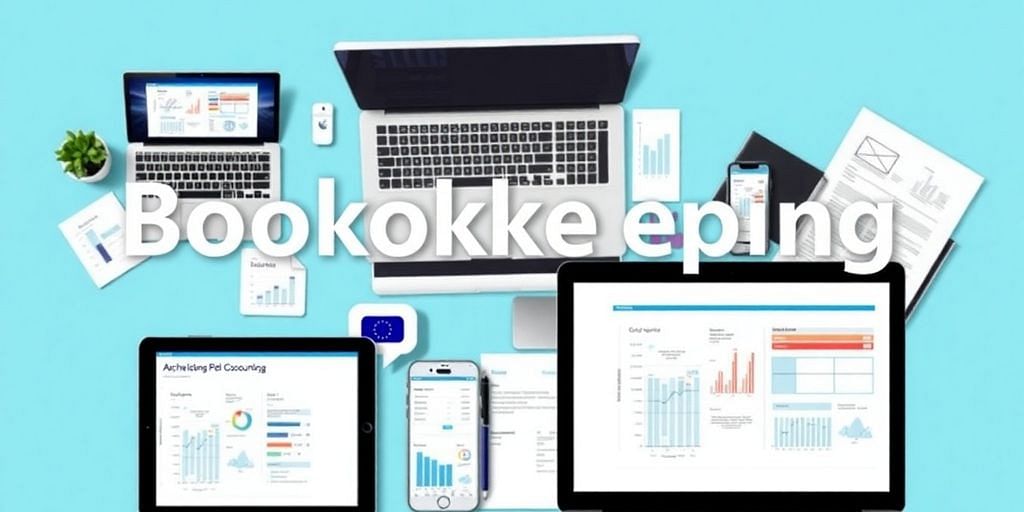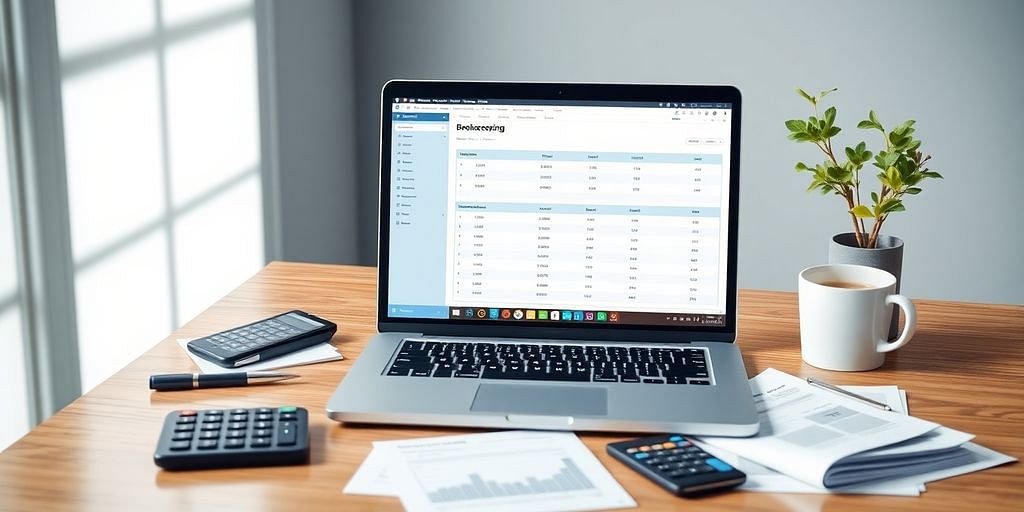
Discovering the Best Bookkeeping Software for Small Business in 2025
Back To BlogExploring The Best Bookkeeping Software For Small Business

Okay, let's jump right into it. Finding the right bookkeeping software can feel like a huge task, but it's super important for keeping our small businesses running smoothly. We've been checking out a bunch of options to see what's looking good for 2025. It's all about finding something that fits our needs without costing a fortune or being too complicated to use. Let's explore some top contenders.
QuickBooks: The All-Rounder
QuickBooks is often the first name that comes up, and for good reason. It's a pretty comprehensive solution that can handle a lot of different tasks, from invoicing to payroll. It's been around for a while, so it's a pretty established player in the game. It's got a ton of features, which can be a plus or a minus depending on what we're looking for. For many, it's a solid choice for top accounting software.
Xero: Flexibility At Its Best
Xero is another big name, and it's known for being really flexible. It's great if we think our business might grow or change a lot in the next few years. It's got a clean interface and lots of integrations, which is always a plus. We think it's a great Xero Accounting option.
Zoho Books: Budget-Friendly Option
If we're watching our budget, Zoho Books is definitely worth a look. It's known for being pretty affordable, especially compared to some of the other big names. It might not have every single feature under the sun, but it covers the basics really well. It's a solid choice if we need something that won't break the bank. Plus, it integrates with other Zoho apps if we're already using those.
Key Features To Look For In Bookkeeping Software

Okay, so we're on the hunt for the perfect bookkeeping software, right? It's not just about picking the shiniest one; it's about finding something that actually works for us. Let's break down the must-have features we should all be looking for.
User-Friendly Interface
Seriously, nobody wants to spend hours trying to figure out how to use accounting software. The interface needs to be intuitive. We're talking about clear navigation, easy-to-understand reports, and a layout that doesn't make us want to throw our computers out the window. If it's clunky and confusing, we're just not going to use it. Here are some things to consider:
- Can we easily find what we need?
- Is the design clean and uncluttered?
- Does it offer helpful tutorials or support?
Integration Capabilities
This is a big one. Our bookkeeping software can't live on an island. It needs to play nice with our other tools. Think bank accounts, credit cards, payment processors, even our CRM. The easier it is to integrate capabilities, the less manual data entry we have to do, and the less likely we are to make mistakes. Here's why it matters:
- Saves time by automating data transfer.
- Reduces errors from manual entry.
- Provides a holistic view of our finances.
Robust Reporting Tools
What's the point of tracking all this data if we can't actually use it? We need bookkeeping software that generates clear, insightful reports. Profit and loss statements, balance sheets, cash flow statements – the whole shebang. These reports help us understand where our money is going, identify trends, and make smarter business decisions. Good reporting tools are non-negotiable.
Bookkeeping software with robust reporting tools is like having a financial GPS. It shows us exactly where we are, where we've been, and helps us chart a course for the future. Without it, we're just driving blind.
Making The Right Choice For Your Business
Alright, so we've looked at some great bookkeeping software options. Now, how do we actually pick the one for your business? It's not about the flashiest features; it's about what fits your needs.
Assessing Your Unique Needs
First, let's be real with ourselves. What does your business actually need? Are you a freelancer just tracking income and expenses? Or are you running a growing e-commerce store with inventory to manage? Understanding your specific requirements is the first and most important step. Think about things like:
- The size of your business now, and where you expect it to be in a few years.
- The types of transactions you handle (invoices, payments, payroll, etc.).
- Any industry-specific needs you might have.
Comparing Features And Pricing
Okay, now for the fun part: comparing all the bells and whistles. Don't just look at the price tag. Consider the value you're getting for your money. Some software might seem cheap upfront, but then you realize you need to pay extra for features you actually need. Look at QuickBooks Online and see if it fits your needs. Here's a quick rundown of what to keep in mind:
- Features: Does it have everything you need, and nothing you don't?
- Pricing: Is it a flat fee, or does it scale with your business? Are there hidden costs?
- Scalability: Can the software grow with you as your business expands?
Getting Feedback From Other Users
Don't just take the software companies' word for it. See what other users are saying. Read reviews, check out forums, and ask around in your industry. Real-world feedback can give you a much better idea of what a software is really like to use. Also, consider asking your accountant for their opinion. They might have experience with different accounting software options and can offer valuable insights.
Choosing the right bookkeeping software is a big deal. It's not just about numbers; it's about making your life easier and giving you the insights you need to grow your business. Take your time, do your research, and don't be afraid to try out a few different options before you commit.
Trends In Bookkeeping Software For 2025
It's wild to think about how much bookkeeping software has changed, even in just the last few years. Looking ahead to 2025, we're seeing some clear trends that are shaping the future of how small businesses manage their finances. It's not just about keeping the books anymore; it's about using technology to work smarter, not harder. Let's take a look at what's coming.
Cloud-Based Solutions
Okay, so cloud-based isn't exactly new, but it's becoming even more essential. The ability to access your financial data from anywhere, at any time, is a game-changer. We're talking real-time collaboration with your accountant, instant access to reports on your phone, and no more worrying about losing data if your computer crashes. Plus, cloud solutions often come with automatic updates, so you're always using the latest version of the software. This is especially important for staying compliant with ever-changing tax laws. Consider cloud accounting for your business.
AI And Automation
Get ready for more AI! We're already seeing AI pop up in bookkeeping software, but in 2025, it's going to be even bigger. Think automated invoice processing, smart expense categorization, and even AI-powered insights that can help you make better financial decisions. Imagine the time we'll save when the software automatically reconciles bank statements or predicts cash flow based on past trends. It's like having a virtual assistant dedicated to your books. This will allow us to focus on growing our businesses instead of getting bogged down in paperwork. We can expect to see more AI driven accounting in the near future.
Mobile Accessibility
We live on our phones, so it makes sense that bookkeeping software is becoming more mobile-friendly. In 2025, expect even better mobile apps that let you manage your finances on the go. This means things like:
- Snapping photos of receipts and automatically uploading them.
- Approving invoices from your phone.
- Checking your bank balance while you're waiting in line for coffee.
- Generating reports on the fly.
Mobile accessibility is all about convenience and flexibility, letting us stay on top of our finances no matter where we are. Make sure to check the mobile features of any software you consider.
As we look ahead to 2025, bookkeeping software is changing fast. New tools are making it easier for businesses to keep track of their money. Features like automatic updates and smart reports are becoming common. If you want to stay ahead and learn more about these exciting changes, visit our website today!
Frequently Asked Questions
What bookkeeping software is best for small businesses in 2025?
QuickBooks is the top choice for small businesses in 2025 because it has a lot of helpful features and is easy to use. It helps with managing payroll, taxes, and tracking money in real-time.
Is Xero a good option for small businesses?
Yes, Xero is a great option! It offers flexibility and can grow with your business. It has a simple design, works well with other tools, and has a strong mobile app.
What features should I look for in bookkeeping software?
Look for software that is easy to use, can connect with other tools you use, and has good reporting features. This will help you keep your business finances organized and clear.
